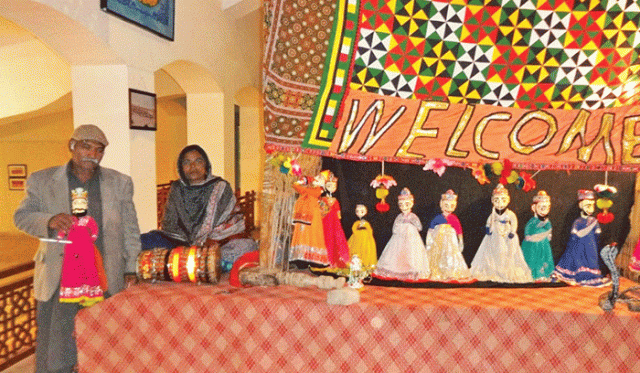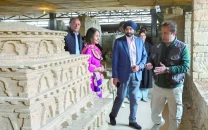Pakistan’s puppeteers struggle to survive
Moti Lal introduced ‘Putli ka Tamasha’ in early 1920s

Jamil and his wife with their puppets. PHOTOS: EXPRESS
Till late 1970s, it used to be one of the major sources of enjoyment and an excellent instrument for communicating social issues of society. It also provided thoughtful messages to the people.
The backdrop
Interestingly, the putli tamasha was introduced in and around the city with the establishment of Lyallpur Cotton Mills – which was set up by Moti Lal in early 1920s. It was the first textile mill in United India.
The owner of the mill brought 500 families from Delhi, who were known as ‘Dehliwalas’ in the city. Some of the members of the Lyallpur Cotton Mills not only introduced but promoted the ‘Putli ka Tamasha’ in this part of the world which subsequently tiptoed into many other areas of Punjab.
Although, puppetry is no more popular these days yet there are some who continue to amuse others with the art form.
Muhammed Jamil, 63, and his wife Dularee, hold puppet shows in different festivals, schools, colleges, and in official ceremonies to earn their livelihood.
While speaking to The Express Tribune, he said “It is his forefathers’ occupation for nearly 300 years.”
“Our forefathers had been travelling across the country and showing their art in festivals. I have spent my whole life to learn this art from my parents. It is not fun to learn it, but it requires your whole life to get these skills,” Jamil said.
Jamil has gained enough expertise after spending many years to make puppets and decorate them with clothes.
The method
While performing, Jamil stands behind the stage and handles the puppets with strings. He gives his voiceover to male characters while his wife puts sound effects with drumbeats.
Jameel makes efforts to present his art combined with our culture and history before the audience. They have been giving life to Mughal Emperor Akbar’s stories and folktales through puppetry.
Jameel said, “I have presented Akbar’s story before the audience only in 30 minutes as it has been written in history.”
“I have learned many folktales of Punjab by heart. In thirty minutes play, I present stories and tales of Dulla Bhatti, Laila Majno, Heer Ranjha and Sassi Panno,” he revealed.
Character aplenty: Puppet show plays with children’s heart strings
He said, “I was born in Multan but spent the major part of life in all provinces of the country to hold puppet shows.”
Jamil added he earns enough to manage two time meals a day but laments, “It becomes difficult to bear other expenditures.”
He said with the passage of time this art will vanish and become part of our history. Jamil also had a book comprising certificates received in government seminars. He also has newspaper clippings relating to puppet shows.
In need of support
To a question, he said, “I earn little and I do not have resources to continue to hold puppet shows.” He added, “Now, few people in the country are performing puppet shows due to lack of funds and government’s support.”
He urged the government to support them so that they continue to hold puppet shows and entertain people.
Published in The Express Tribune, March 6th, 2017


















COMMENTS
Comments are moderated and generally will be posted if they are on-topic and not abusive.
For more information, please see our Comments FAQ